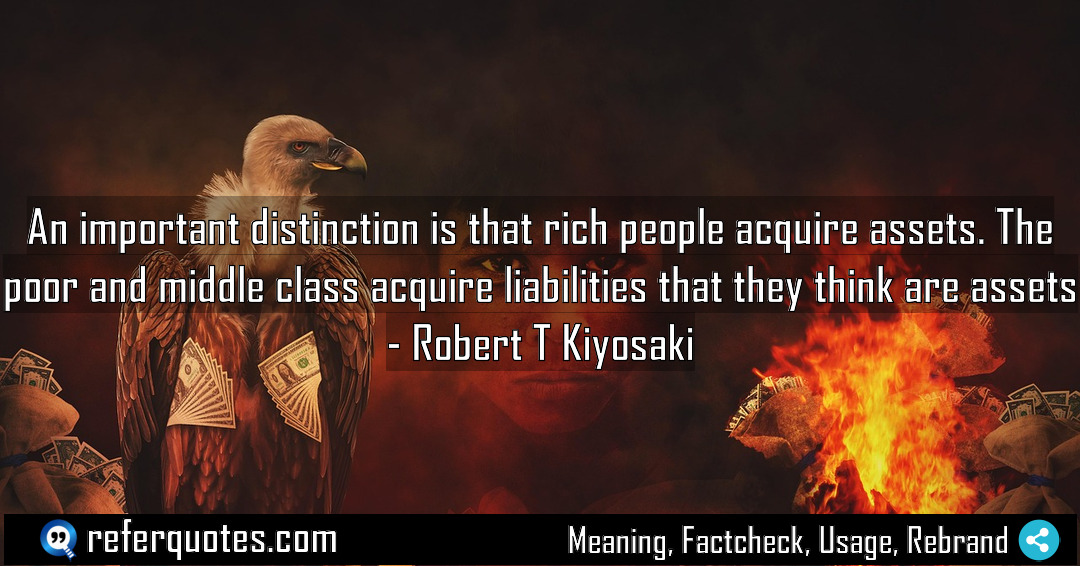“An important distinction is that rich people…” This quote cuts to the core of the wealth gap. It’s not about income, but about what you *do* with that income.
Share Image Quote:Table of Contents
Meaning
The core message is that wealth isn’t defined by what you earn, but by the financial nature of what you own. The rich focus on things that put money *in* their pocket, while others accumulate things that take money *out*, often without realizing it.
Explanation
Look, this is the part that changed my entire perspective. For years, I thought a high salary was the goal. But that’s just the fuel. The real game is what you build with that fuel. An asset, in Kiyosaki’s world, isn’t just a stock or a bond. It’s anything that generates cash flow, that works for you while you sleep. A liability, on the other hand, is anything that creates an ongoing expense.
Here’s the kicker, and where most people get tripped up: the middle class often buys what they’re *told* are assets. A bigger house? That’s a massive liability—property taxes, maintenance, a bigger mortgage. A new car? The ultimate depreciating liability. They trade their paychecks for monthly payments on stuff that loses value. The wealthy, they use their capital to acquire income-producing real estate, businesses, intellectual property… things that pay for themselves and then some. It’s a fundamental difference in mindset, not just in money.
Quote Summary
| Context | Attributes |
|---|---|
| Original Language | English (3668) |
| Category | Wealth (107) |
| Topics | assets (6), liabilities (3), money (27) |
| Literary Style | analytical (121), educational (37), precise (9) |
| Emotion / Mood | rational (68) |
| Overall Quote Score | 81 (258) |
Origin & Factcheck
This concept is the absolute cornerstone of Robert Kiyosaki’s 1997 book “Rich Dad Poor Dad,” which was first published in the United States. The book is presented as a parable based on the financial lessons he learned from his two “dads”—his highly educated but financially struggling real father (“Poor Dad”) and the entrepreneurial father of his best friend (“Rich Dad”). It’s crucial to note that Kiyosaki has stated the “Rich Dad” is a composite character, so the stories are illustrative rather than strictly biographical.
Attribution Summary
| Context | Attributes |
|---|---|
| Author | Robert T Kiyosaki (98) |
| Source Type | Book (4032) |
| Source/Book Name | Rich Dad Poor Dad (43) |
| Origin Timeperiod | Contemporary (1615) |
| Original Language | English (3668) |
| Authenticity | Verified (4032) |
Author Bio
Born in Hilo, Hawaii, Robert T. Kiyosaki graduated from the United States Merchant Marine Academy and served as a Marine Corps helicopter gunship pilot in Vietnam. After stints at Xerox and entrepreneurial ventures, he turned to financial education, co-authoring Rich Dad Poor Dad in 1997 and launching the Rich Dad brand. He invests in real estate and commodities and hosts the Rich Dad Radio Show. The Robert T. Kiyosaki book list spans personal finance classics like Cashflow Quadrant and Rich Dad’s Guide to Investing, along with educational games and seminars.
| Official Website | Facebook | X| Instagram | YouTube
Where is this quotation located?
| Quotation | An important distinction is that rich people acquire assets. The poor and middle class acquire liabilities that they think are assets |
| Book Details | Publication Year/Date: 1997; ISBN/Unique Identifier: 978-1612680194; Last edition: 2022 Revised Edition, Number of pages: 336 |
| Where is it? | Chapter 3: Why Teach Financial Literacy, Approximate page from 2022 edition: 74 |
